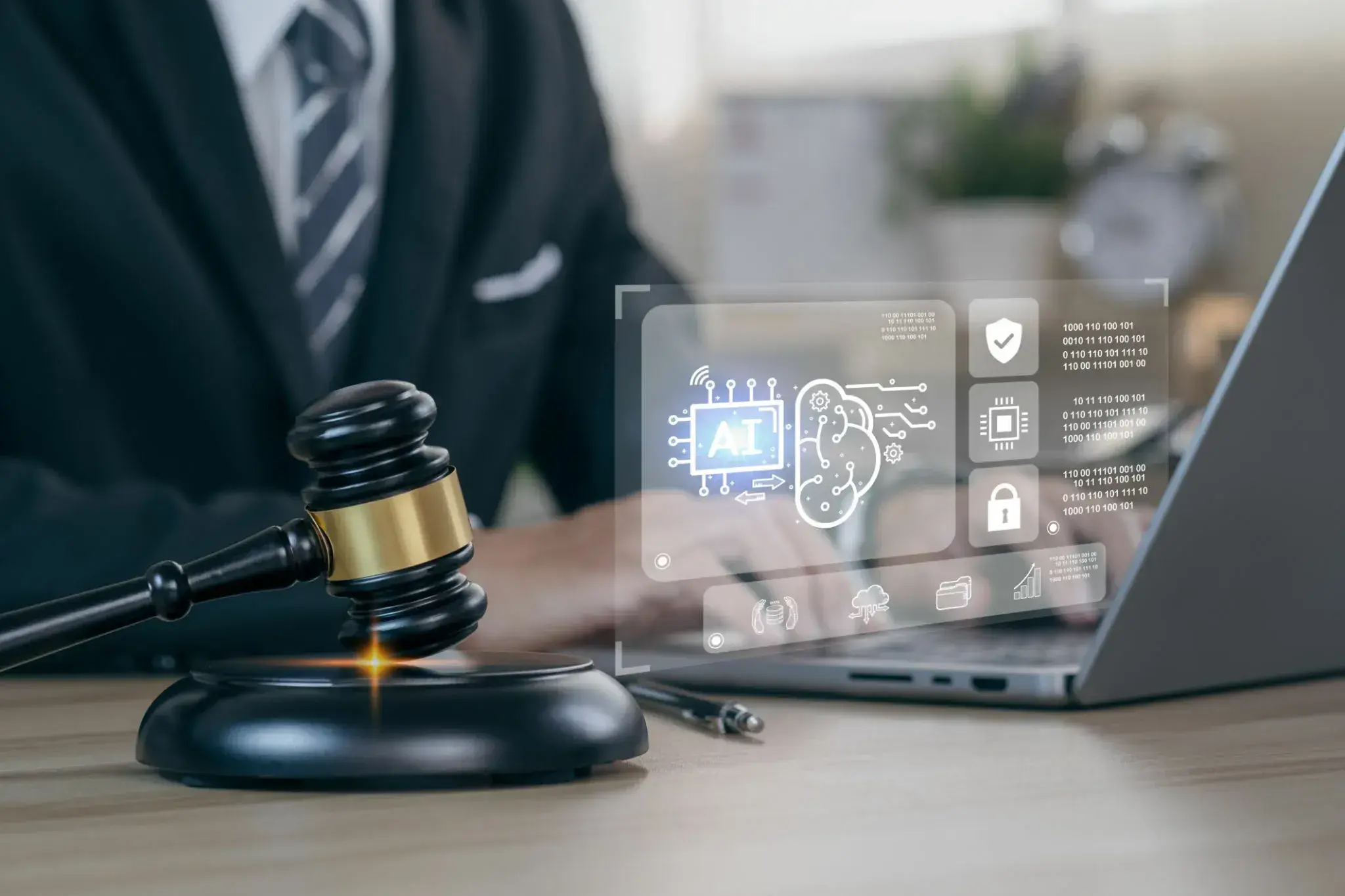The AI Frontier in Law: 12 Innovative AI Tools for Law Firms
Introduction
Artificial Intelligence companies continue to drive innovation to streamline arduous tasks and increase productivity across various sectors. Legal firms, too, have experienced a revolution since the advent of perceptive AI tools.
By 2024, the global expenditure on legal AI software tools is expected to hit $37 billion, reflecting a significant shift towards technology in the legal industry and its impact on processes and outcomes.
AI tools for lawyers help optimize operations, enhance efficiency, and cut expenditures within law practices. But with a plethora of options to choose from, it can be challenging to choose the most suitable tool for your firm. This leads to wasting valuable resources, time, and money while impacting your reputation amongst your clients.
This article explores the benefits and applications of AI tools in the legal sector. It offers practical insights and a valuable checklist to guide legal firms in selecting the most suitable AI tool for their specific requirements.
Benefits of AI in the Legal Industry
One of the most apparent benefits of using AI tools is saving time. Computer systems can definitely analyze more information thoroughly in less time than humans.
AI tools for lawyers enable streamlined document review, enhanced legal research capabilities, improved decision-making through data-driven insights, and ultimately contribute to optimizing legal processes.
Our analysis of law firms incorporating AI tools reveals four key legal advantages.
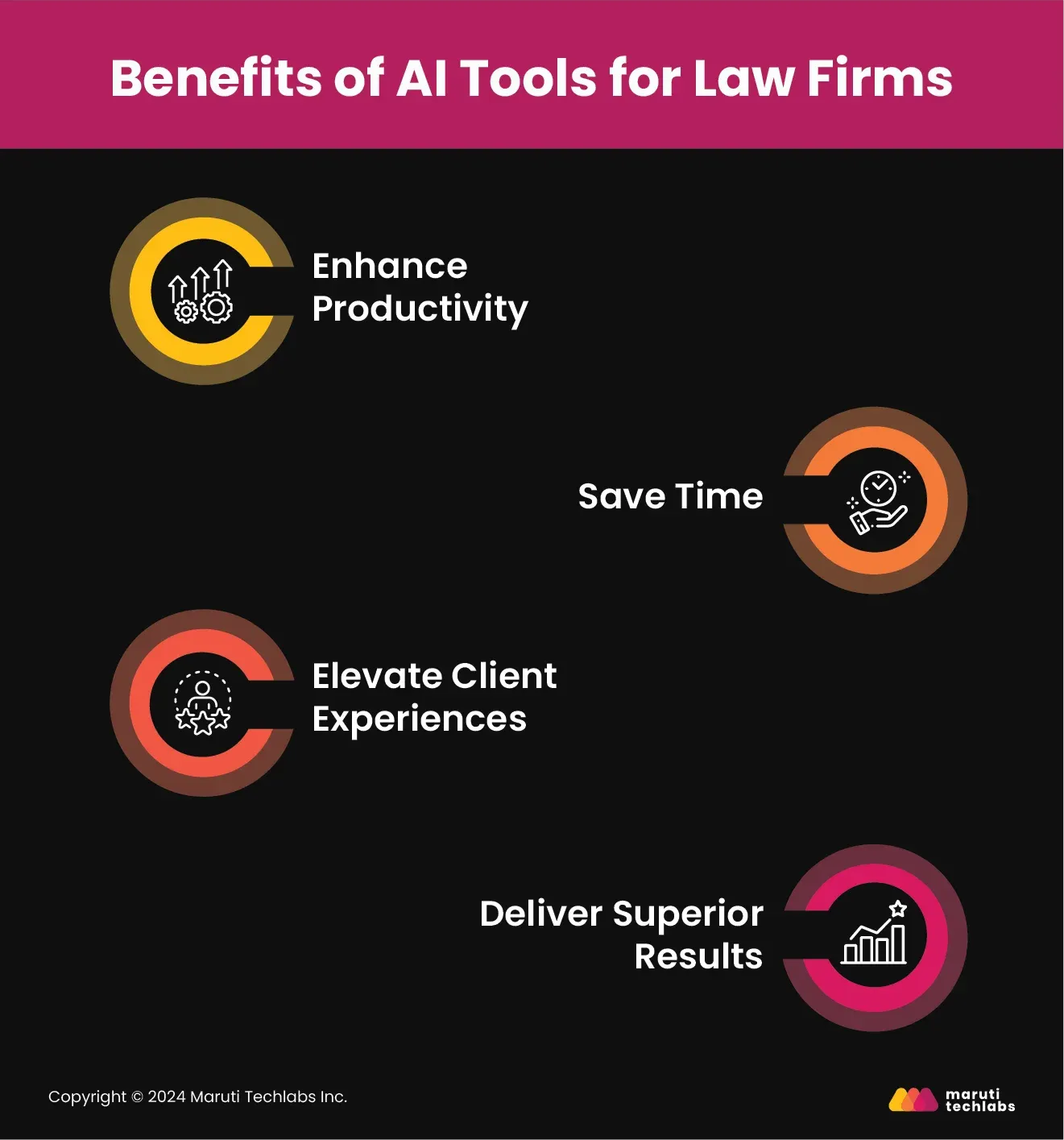
1. Enhance Productivity
Legal AI tools can help streamline your firm’s workflow by automating repetitive and routine tasks. This streamlines the workflow within the firm and allows lawyers to focus on more strategic and complex aspects of their work.
2. Save Time
AI legal research tools can swiftly process and analyze vast amounts of data in no time, significantly reducing the time and effort invested in manual processes. The saved time can be directed toward other crucial tasks and meeting clients' needs.
3. Elevate Client Experiences
AI tools for lawyers can establish client-centric law firms, craft refined experiences, and expand clientele. For instance, legal AI software can analyze legal data to extract valuable insights and trends, allowing lawyers to offer clients strategic advice based on data-driven decisions.
4. Delivers Superior Results
Manual errors are unavoidable when conducting repetitive or attention-intensive tasks. Legal AI tools, on the other hand, ensure higher standards of accuracy when examining documents for errors or omissions in clauses.
Artificial Intelligence in Law: Current Applications
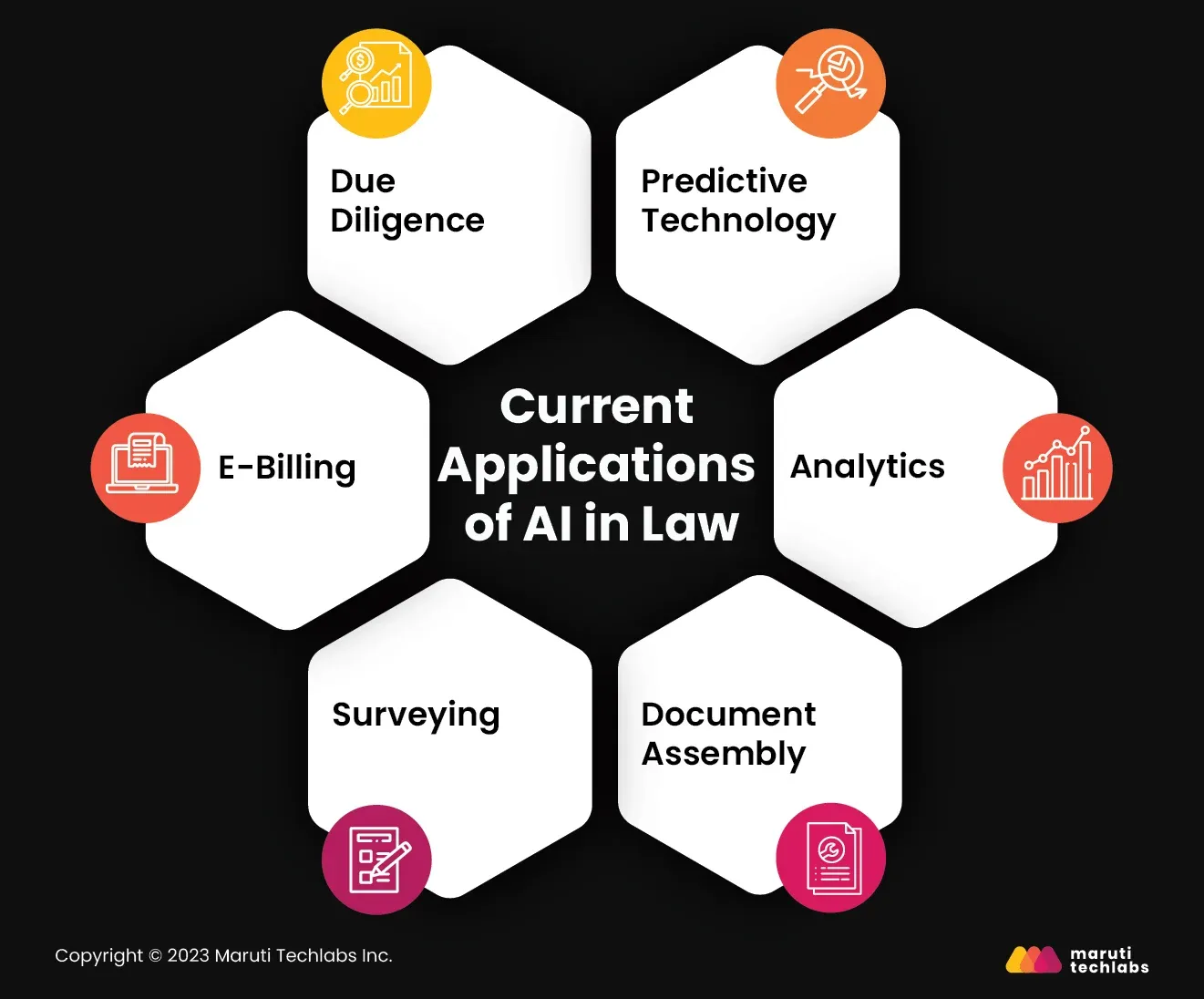
AI tools have significantly transformed the legal landscape, revolutionizing various aspects of the field. Here are six AI legal applications reshaping and enhancing the legal profession.
1. Due Diligence
Litigators can employ AI tools to conduct due diligence, using them to do background checks, including legal research, contract review, and electronic discovery, including examination of digital documents, emails, databases, and other forms of electronic data.
2. Predictive Technology
AI-driven legal analytics significantly enhance predictive technology by examining case details and legal precedents. These tools, powered by machine learning algorithms, predict case outcomes, allowing law firms to refine litigation strategies, facilitate early settlements, and reduce the number of cases proceeding to trial.
3. Analytics
Legal professionals can utilize historical case data, win/loss rates, and a judge's prior decisions to identify trends and patterns. By extracting insights from this information, lawyers understand effective legal strategies and potential judicial preferences.
4. Document Assembly
Litigators can streamline document creation using preset software templates that automatically generate pre-populated documents based on input data. Legal document automation eliminates repetitive manual work, ensuring consistency across documents and reducing the likelihood of errors.
5. Surveying
AI tools for lawyers offer comprehensive content analysis and inspection of significant intellectual property portfolios. AI enables data classification, clustering, and semantic searches, making it easier to retrieve relevant data.
6. E-Billing
Electronic billing platforms are emerging, offering secure alternatives to paper invoices. Legal AI tools render precise finance tracking and digital trails, minimize disputes, and enhance reporting accuracy. Attorneys can calculate billable hours automatically, reducing paper costs and providing explicit client adjustments.
Legal Document Review and Management Tools
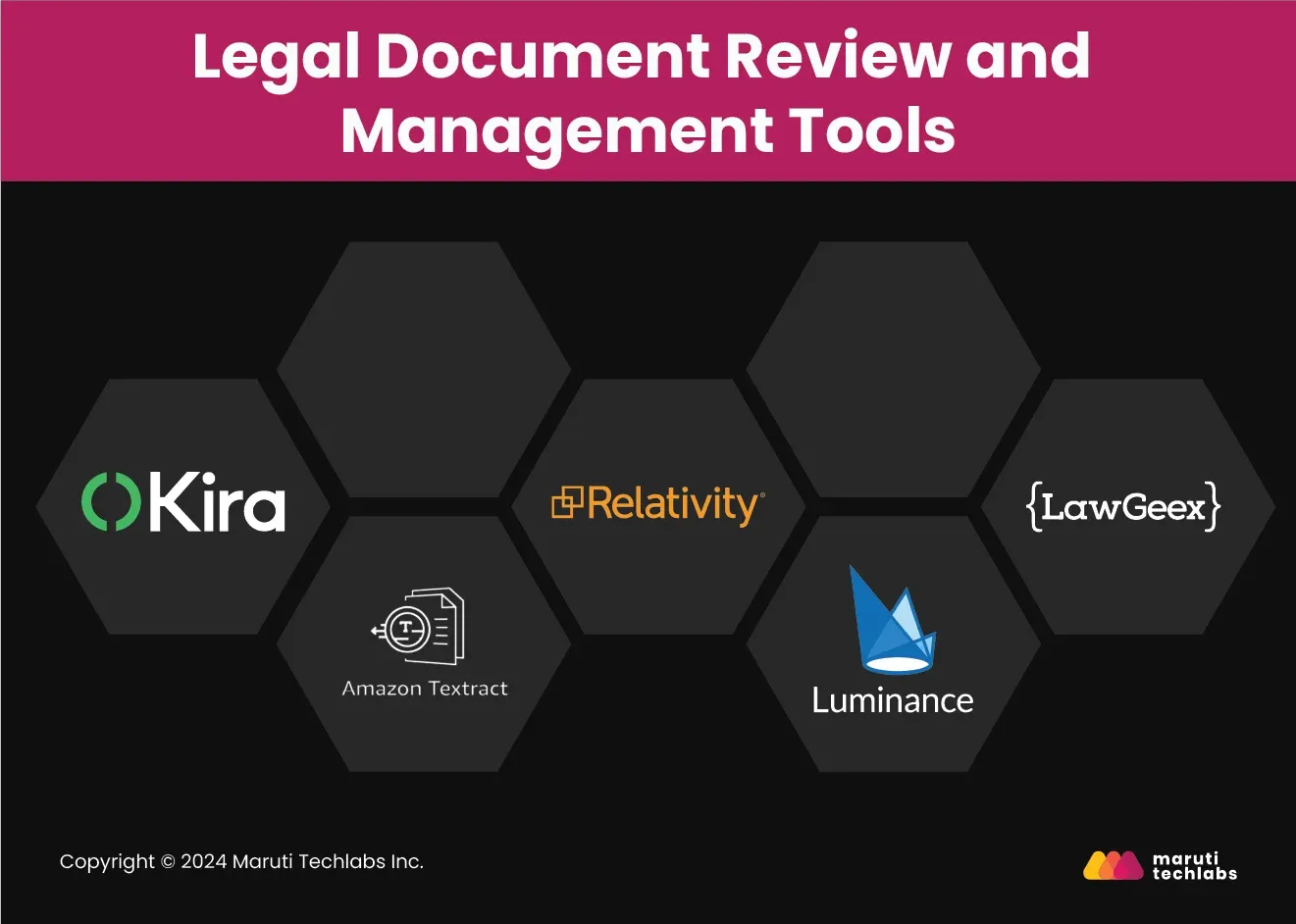
Legal document review is a crucial aspect of the legal profession, often involving the analysis and assessment of extensive volumes of documents, contracts, and legal texts. This process is traditionally time-consuming and labor-intensive.
AI tools for lawyers have revolutionized legal document review by significantly enhancing efficiency, accuracy, and scalability. Leveraging advanced algorithms, these tools swiftly analyze extensive datasets, ensuring precision and consistency while eliminating the risk of human errors.
Here are some of the most sought-after AI tools that have become indispensable for legal document review.
1. Kira Systems
Kira effortlessly learns, extracts, and examines contracts present in contracts and documents using its machine learning algorithms. It streamlines locating and utilizing authentic information from your documents.
It helps lawyers know clauses and data points in less time than it traditionally takes. Many factors are responsible for factual errors that occur when conducting due diligence.
According to Noah Waisberg, a former M&A lawyer and founder of software company Kira Systems, several reasons contribute to the due diligence errors conducted by junior lawyers.
Noah Waisberg observes, "Many associates are in a certain negative mood about the efficacy of manual due diligence. Lawyers, being human, get tired and cranky, with unfortunate implications for voluminous due diligence in M&A.”
Features
- Advanced machine learning for contract analysis.
- Extracts and categorizes relevant information from complex legal documents.
- More accurate due diligence contract review by extracting and analyzing relevant content.
- 40% faster completion rate for first-time users and up to 90% for experienced professionals.
- Multiple content reviews, data linked to sources, error reduction, and improved efficiency.
Use Cases
Kira Systems is often used in the legal industry for due diligence, contract management, and compliance. It helps legal professionals quickly identify and analyze critical terms, obligations, and risks within large volumes of legal documents.
2. Relativity
Relativity is a preferred tool that significantly simplifies discovery. This tool can accelerate decision-making by deciphering agreements into actionable and structured data. Out of the 200 AmLaw firms, Relativity is leveraged by 198 firms. The company has a range of AI tools for law firms of any size. One can select from the flexible pricing plans depending on your tool requirements.
Features
- Comprehensive e-discovery platform.
- Advanced analytics and customizable workflows.
- Powerful searching functionalities for document review and case management.
- Automate the data collection process from diverse sources within workflows.
- Provide a central dashboard to view AI insights and manage the document review process.
- Redact sensitive data and privileged information efficiently.
- Translate documents into various languages.
- Improve faster over time by imbibing its users' learnings.
Use Cases
Relativity is primarily used in the legal industry for e-discovery in litigation cases. It helps legal professionals organize, review, and analyze electronic documents, emails, and other digital information to identify relevant evidence.
3. LawGeex
LawGeex is a legal AI software streamlining the contract review process for businesses and law professionals. It ensures compliance with internal and external regulations while scrutinizing various contracts and flagging potential concerns.
Features
- Specializes in automating the contract review process.
- Leverages machine learning algorithms to analyze and collate contracts meticulously against predefined criteria.
- Identifies key clauses and potential risks and ensures compliance.
- Integrates seamlessly with standard CRM systems, ensuring a smooth exchange of data among various legal tools and optimizing workflow.
- Enables users to assign tasks, track changes, and add comments within the platform.
Use Cases
LawGeex is commonly used for contract review and approval processes. It helps legal teams streamline their contract management workflows, ensuring compliance and reducing the time required for manual contract reviews.
4. AWS Textract
AWS Textract uses ML algorithms to extract data and text from forms and tables in other virtual documents without being an ML expert.
For instance, if one has hard copies of bills from different companies and wants to store essential information from them on spreadsheets. Our primary approach is contacting data entry operators, which can be error-prone and time-intensive.
Using AWS Textract, we only have to upload a scanned image, document, or PDF, and it returns all tables, text, forms, and key-value pairs in documents in a more structured manner.
Features
- Utilizes machine learning to extract textual content, forms, and tables automatically
- Standardized normalization and systematic data collection.
- Key-value parsing and extraction.
- Efficient search indexing system.
- Identification and conversion of handwritten text is crucial due to its complexity compared to printed text.
Use Cases
AWS Textract is used in various industries for document analysis and data extraction. It is particularly valuable for digitizing paper documents, automating data entry processes, and enhancing the efficiency of document management systems.
5. Luminance
At its core, Luminance is a document review platform offering advanced solutions for litigation, due diligence, investigations, and arbitrations.
Conventionally, it’s an uphill task to review documents. While AI offers promising solutions, it also demands adequate employee training to leverage its true potential. These factors often act as barriers to legal professionals adopting this technology.
Features
- Leverages machine learning and natural language processing.
- Identifies patterns, anomalies, and critical information within legal documents.
- Offers an intuitive user interface with its AI solution, addressing these hurdles effectively for lawyers.
- Embraces both supervised and unsupervised machine learning techniques.
- Addresses broader legal requirements such as compliance and property concerns, extending beyond M&A due diligence.
Use Cases
Luminance is employed in legal, due diligence, contract analysis, underwriting, and other legal document review processes. It assists legal teams in identifying critical information, risks, and opportunities within large datasets of legal documents.
Legal Research and Case Prediction Tools
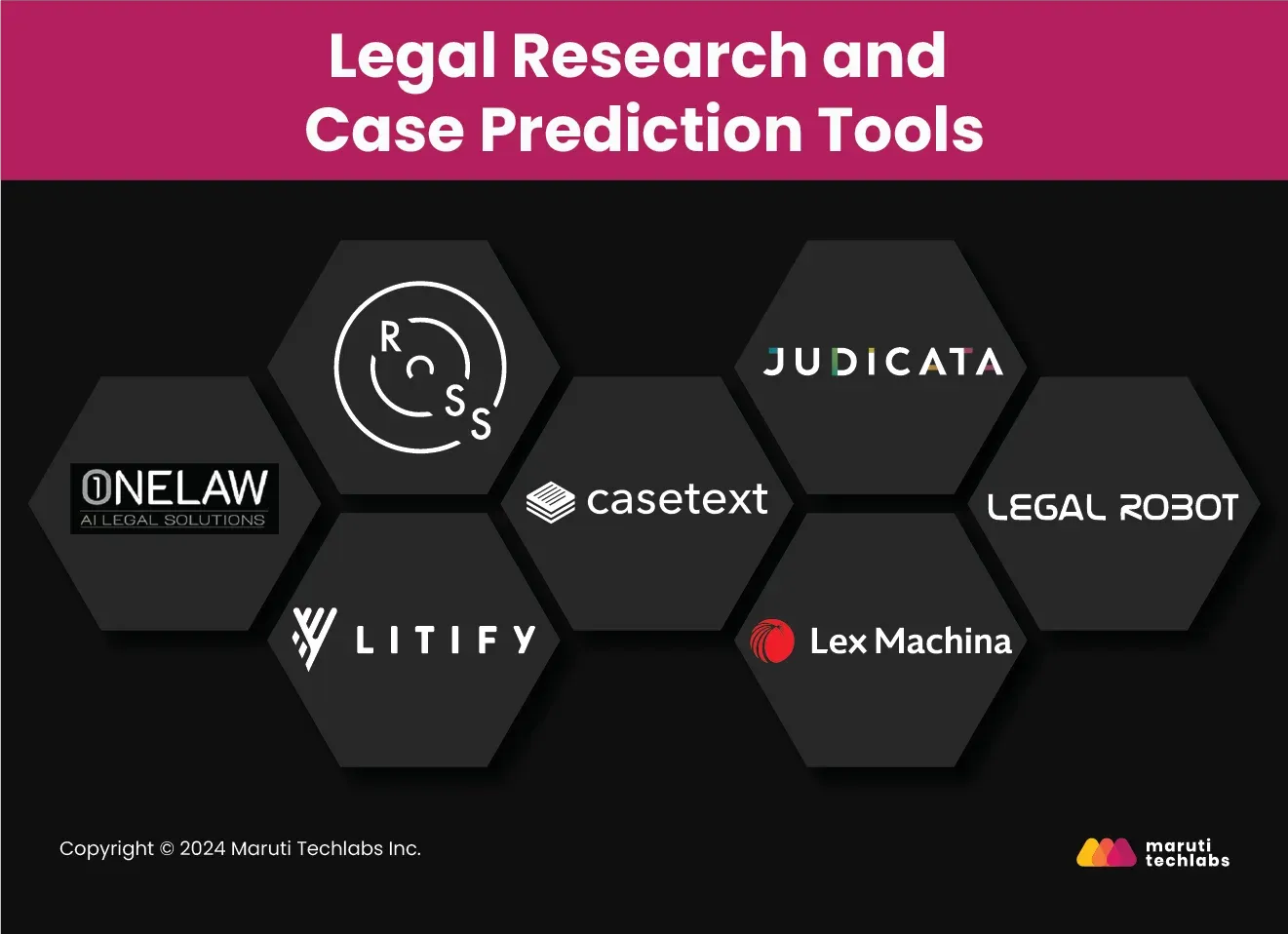
Here’s a list of AI tools for lawyers that can assist with legal research and predicting case outcomes.
1. OneLaw.ai
OneLaw.ai is exceptional in interpreting and analyzing legal documents using natural language processing. The tool helps expedite research efforts while enhancing the quality and helping users swiftly understand the relevance and impact of specific cases.
Features
- Fosters efficient search capabilities to find desired information, offering easy access to learning regulations, statutes, and case law.
- Create briefs by summarizing complicated court opinions.
- Offer streamlined search capabilities along with citation analysis.
- Conceptualize intricate connections between statutes, cases, and regulations.
- Empower legal professionals with quick research and document retrieval by facilitating mobile access.
Use Cases
OneLaw.ai provides case management solutions for law firms, helping them efficiently organize and manage their legal cases, documents, and client information.
2. ROSS Intelligence
Lawsuits and court cases demand diligent legal research. However, in a limited timeframe, lawyers can feel overwhelmed from exploring numerous links, extensive readings, and gathering diverse information.
ROSS Intelligence makes this job easier by applying natural language processing. It assists with retrieving information like recommended readings, related case law, and supplementary sources by asking questions.
Andrew Arruda, Chief Executive of ROSS Intelligence, stated, "ROSS surfaces relevant passages of law and then allows lawyers to interact with them. Lawyers can either enforce ROSS’s hypothesis or get it to question its hypothesis.”
BakerHostetler, an American law firm, shared its experience of how you can ask ROSS direct questions such as “What is the Freedom of Information Act?” and how it responds by providing references and citations. Similar to other machine learning systems, ROSS improves with use.
Bob Craig, Chief Information Officer at BakerHostetler, remarked, "ROSS is not a way to replace our attorneys – it is a supplemental tool to help them move faster, learn faster, and continually improve.”
Features
- Designed with contextual understanding capabilities.
- Utilizes artificial intelligence to enhance and expedite the legal research process.
- Employs NLP technology, allowing users to input queries conversationally.
- Provides summarized versions of legal cases.
- Provide updates and alerts on legal developments relevant to a user's specified areas of interest.
Use Cases
ROSS Intelligence excels in AI-powered legal research. It helps legal professionals quickly find relevant case law and legal documents, streamlining the research process.
3. Litify
Litify is a do-it-all legal operating platform created to dismantle business silos, to enhance process, collaboration, insights, and performance.
Features
- Serves in-house teams, government agencies, law firms, and nonprofits, yielding better outcomes for teams and clients and benefiting the legal ecosystem.
- Using the Salesforce infrastructure, Simplifies and automates task management, document formation, billing, time tracking, and customer interactions.
- Leverages data to share insights that allow legal firms to enhance and scale performance.
Christopher Stratton, Senior Partner, Hightower, Stratton, Novigord & Kantor, implemented a tactical shift with Litify and quoted, “It wasn’t just about selecting a great software, we also wanted to improve and standardize our firm’s process. We saw Litify as an opportunity to create something even better while helping us move forward with the times”.
Use Cases
Litify helps in case management, client relationship management (CRM), and workflow automation. It aims to enhance collaboration and efficiency within law firms.
4. Casetext
Casetext, a legal AI tool, merges advanced search capabilities with an extensive legal database to offer an AI-powered legal research platform.
Features
- Features a robust AI search engine, CARA, which helps access regulations, statutes, case law, and supplementary materials.
- Ensures precision in legal research, enhances efficiency, and presents the most pertinent information using CARA’s context-sensitive search abilities.
- Allows creating personalized research folders, collaborating with peers, and annotating documents with advanced research utilities.
- Integrates seamlessly with document automation and legal practice management tools, ideal for optimizing research workflows.
Use Cases
Casetext is helpful in legal document analysis. It helps legal professionals find relevant cases, statutes, and regulations more effectively.
5. Lex Machina
Lex Machina has earned the reputation of offering the most transparent, complete, and accurate analytics data.
Features
- Shares comprehensive Outcome Analytics with vital details such as findings, damages, remedies, and resolutions. These are essential to learning the results and intricacies of a case.
- Offers an exclusive search feature that uses practice-specific filters and tags to find all the cases. The software sets itself apart with its patented Attorney Data Engine.
- Provides an accurate record of your lawyers' and opponents' appearances by adding missing counsel data and rectifying it.
- Enables lawyers to delve from high-level trends to underlying documents and case files while displaying your methodology.
- Clarifies the origins and meaning of information related to findings, case types, tags, and other elements.
Use Cases
Lex Machina specializes in legal analytics, providing insights into litigation trends, case strategies, and judicial behaviors. It helps legal professionals make data-driven decisions.
6. Judicata
Judicata was created with a strong belief in leveraging technology that assists attorneys in achieving successful outcomes for their clients by delivering critical information.
Features
- It uses deep analysis and artificial intelligence capabilities and has created its software ‘Clerk,’ which delivers contextual, precise, and comprehensive results by analyzing legal briefs.
- Provides a user action item list that includes content error reduction recommendations.
Currently, Judicata serves only California state law and is looking to expand to other states soon.
Beth Hoover, Product Manager, Judicata, claims, "Clerk helps reduce these errors by identifying the quotations in a brief and cross-checking them against the cited case to ensure the text is identical and the page numbers are correct.”
Use Cases
Judicata excels in legal research and analysis, offering tools to extract meaningful information from legal texts. It aims to provide comprehensive and accurate insights for legal professionals.
7. LegalRobot
LegalRobot helps users create and understand legal documents using its AI-powered platform. The platform caters to individual needs with its ability to customize legal documents, document analysis, and automate contract drafting.
Features
- Comprehends legalese and makes it understandable using simple language. This feature also assists non-lawyers with understanding the accuracy of generated content and understanding complex legal documents.
- Analyze various documents, from agreements and contracts to terms of service and privacy policies.
- Its distinctive attributes encompass custom template creation and a library of pre-existing templates.
Use Cases
Legal Robot specializes in analyzing legal documents. It assists in contract review and helps identify potential issues or discrepancies in legal texts.
How Do You Choose the Right AI Tool for Your Law Firm?
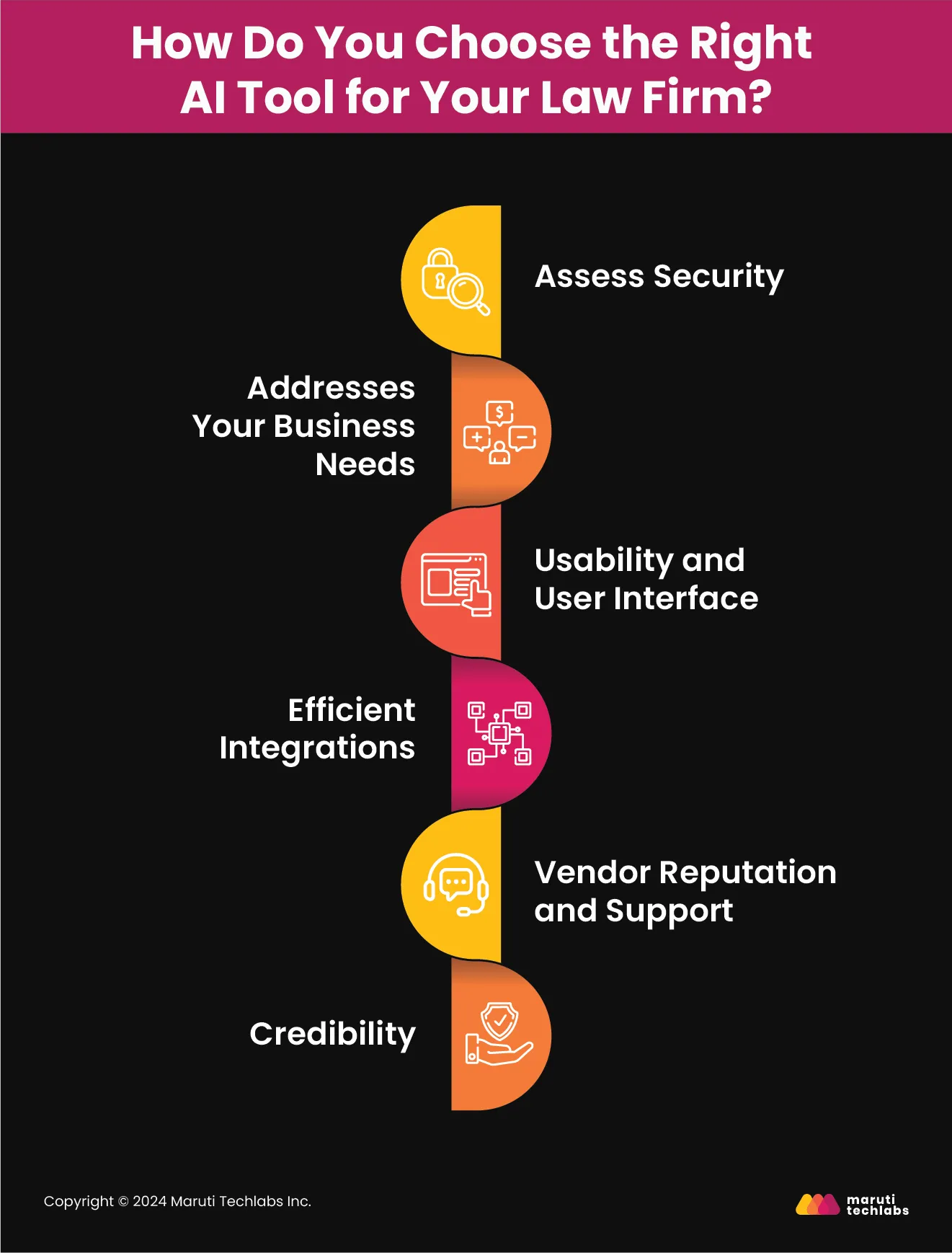
Understanding your choices is crucial when picking AI tools for lawyers or law firms. But knowing which tool best resonates with your needs and goals is more important.
Here is a checklist to help you choose an AI tool for your law firm.
1. Assess Security
Handling sensitive and confidential client information is a part of your routine in this profession. You should select an AI tool that implements rigorous security protocols.
Ensure your chosen provider follows data privacy best practices and employs industry-standard security measures, covering internal and external security resources.
2. Addresses Your Business Needs
The range of new and valuable AI tools for lawyers can overwhelm you, tempting you to make the wrong investments. Remember, an ineffective approach is to adopt too many tools without a well-thought strategy.
A good practice would be to examine the most time-intensive and laborious tasks (like legal research or manual contract review) and then select tailored AI-powered solutions to enhance efficiency in those areas.
3. Usability and User Interface
No matter how innovative an AI tool is, the end user should always be considered before deciding. A tool might not be the best fit if it’s highly complex, has no intuitive user interface, and can’t be accessed by a non-technical person or legal professionals at your firm.
4. Efficient Integrations
The integrations an AI tool offers are an essential factor to consider for lawyers. You can create more efficient workflows if a potential AI tool integrates well with your legal case management system.
5. Vendor Reputation and Support
Evaluating the vendor is as important as examining the features of a specific AI tool. Questions like:
- What reputation do they hold among other peers in the industry?
- For how long have they been in this business?
- Have there been any data leaks or security breaches with their AI tool?
- How are their post-sales services?
Without sufficient client support, even a remarkable AI tool can lead to frustration and loss of valuable time for your law firm.
6. Credibility
Before purchasing, A prominent question is whether this tool would benefit your firm or if you fall prey to the AI hype. According to the FTC, many AI tools have realistic claims, while others might exaggerate.
We suggest you select AI solutions with straightforward concepts. Additionally, it's crucial to evaluate if the company (tool) you choose is a longstanding player or a recent AI adopter. To reap potential benefits—research extensively by engaging with your sales teams and questioning every aspect and scenario to reap potential benefits.
Juan A de Rueda, vice president of legal of the Iberia Business Unit at Coca-Cola Europacific Partners, acknowledged the importance of automation tools with Navarro during an Esade round-table panel event and quoted, “We see practical advantages in drafting and reviewing contracts, as well as studying the possibility of adopting automated legal advice for those services that involve less added value that, however, require the use of many resources.”
Conclusion
A cloud of skepticism surrounds the adoption of AI-legal tech applications. Yet, the contribution automation can introduce to many internal and client-facing processes cannot be overlooked.
Improving efficiency and automating mundane, repetitive tasks are two of the most acknowledged benefits of AI tools in the legal sphere. AI software also processes documents efficiently while detecting errors and other discrepancies.
AI can never compete with the experience of a seasoned lawyer. But it can’t be denied that the right AI tools can help attorneys reduce costs while increasing efficiency and productivity.
Yet, before you embrace any AI tool, garnering a comprehensive evaluation of the same is crucial. Remember, only if an AI tool is used responsibly can it help law firms provide better service to their clients and stay competitive.
Early AI adoption by legal firms will yield swift, significant results rapidly, enabling cost savings that can be immediately passed to the clients. A secure path to adopting AI is starting small, seeking adequate consultations, and conducting trials before making a substantial investment.
Maruti Techlabs offers tailored AI solutions for legal firms, ensuring a smooth transition. We provide deep insights into customizing AI, supporting employees through adoption, and seamlessly merging technology with legal expertise for innovative outcomes.
Contact us to explore how AI tools and human expertise can be strategically integrated for maximum benefits in the legal field.





